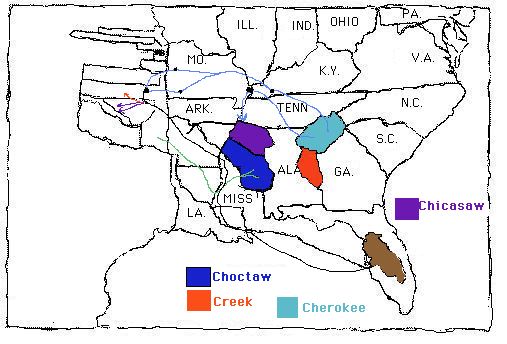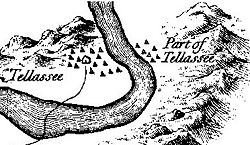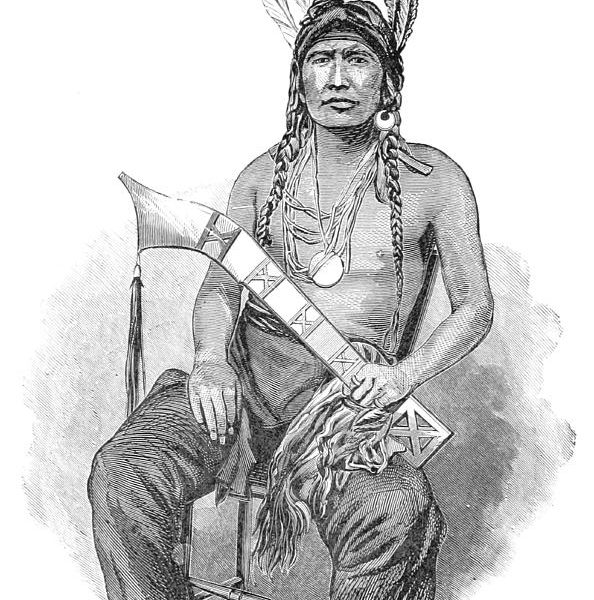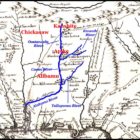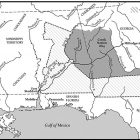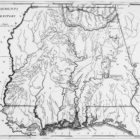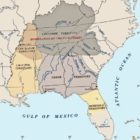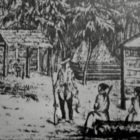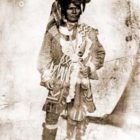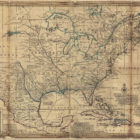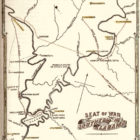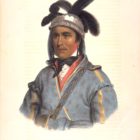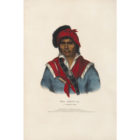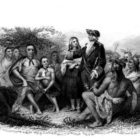Tallassee (also “Talassee,” “Talisi,” “Tellassee,” and various similar spellings) is a prehistoric and historic Native American site in Blount County and Monroe County, Tennessee, in the southeastern United States. Tallassee was the southernmost of a string of Overhill Cherokee villages that spanned the lower Little Tennessee River in the 18th century. Although it receives scant attention in primary historical accounts, Tallassee is one of the few Overhill towns to appear on every major 18th-century map of the Little Tennessee Valley.
Alabama Indian Villages, Towns and Settlements
The Creek Confederacy
|
The Creek Confederacy was a loose coalition of ethnically and linguistically diverse Native American towns that slowly coalesced as a political entity in the 18th and early 19th centuries.
Alabama Indian Villages, Towns and Settlements
Abikakutchee
|
Abikakutchee was another Upper Creek Indian town located in Talladega County. The site was first recorded on maps in 1733 and a census in 1760 listed 130 Indian warriors living there.
Fushatchee Tribe
|
Fushatchee were a Muscogee sub-tribe. They were located were Alabama and Florida in the United States.
Alabama Native American Tribes
Atasi Tribe
|
Atasi Tribe
A sub-tribe of the Muskgoee. The Muscogee, also known as the Muskogee, Muscogee Creek, Creek, Mvskokvlke, or the Muscogee Creek Confederacy (pronounced [məskógəlgi]) in the Muscogee language, are a related group of indigenous peoples of the Southeastern Woodlands. Their original homelands are in what now comprises southern Tennessee, all of Alabama, western Georgia and part of northern Florida. Atasi, in its later years, was on close terms of intimacy with Tukabahchee, of which it was said to be a branch. While this may have been the case, its independent history extends back to very early times.
Alabama Native American Tribes
Apalachicola Tribe
|
Spanish documents of the seventeenth century are the earliest in which the name appears. It is there used both as the name of a town (as early as 1675) and, in an extended sense, for all of the Lower Creeks. This fact, Muskogee tradition, and the name Talwa Iako all show the early importance of the people.
Alabama Indian Villages, Towns and Settlements
Abihka Creek Indian Village
|
Abihka was one of the four mother towns of the Muscogee Creek confederacy. It is now a ceremonial ground in Okmulgee County, Oklahoma. Abihka is also sometimes used to refer to all Upper Creek (or Muscogee) peoples.
Alabama Indian Villages, Towns and Settlements
Apalatchukla: A Lower Creek Town
|
In Hawkins’time it was in a state of decay, but in former times had been a white or peace town, called (even now) Talua ‘lako, ”large town,” and the principal community among the Lower Creek settlements.
Creek Indian Tribe
Hilabee: An Important Creek Town
|
The Hillabee complex, focused along the Hillabee and Enitachopco Creeks, dates back at least to the late 17th century. During the late 18th and early 19th centuries the complex lay in the approximate center of the Creek Confederacy’s territory. Its population probably peaked after the Creek War (1813–14), then declined. Creek settlement in the area ended with the forced removal of the Muscogee people during the 1830s.
Opothleyaholo: Creek Chief
|
No facts have been preserved of the early life of Opothleyaholo, except that he was considered a promising youth, nor is it known when he rose to the position of speaker of the councils of the Upper Creek towns. His residence was in Tuckabachee, near the great council house.
Nehemathla Micco or Neamathia Micco: Creek Chief
|
Neamathla and the Fowltown warriors, all Red Sticks, were defeated in the Battle of Uchee Creek (1813) by the “southern” Creeks. They might have won had they not run out of ammunition. When a supply party with ammunition was attacked on its return from Pensacola — a preemptive strike — by U.S. forces, the Red Sticks defeated them at the Battle of Burnt Corn.
Alabama's Famous, Legendary & Notorious
Great Mortar, Yayatustenuggee, Yayatatastenake, or Otis Micco
|
He was born in Okchaiyi, belonged to the Bear clan, and became a prominent chief of his native town. He did his trading at Fort Toulouse, and during the French and Indian war was in the French interest.
Selected Readings from Volume II
Malatchee, Malahchee or Majla-Chi: Creek Chief
|
… the young Malatchee had so signalized himself as a warrior, that he was looked upon as the greatest man in the Creek Nation.
